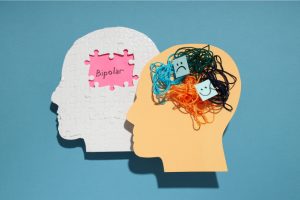Depression and Mood Disorders

Depression and Mood Disorders
At Manoshanti Neuropsychiatry Clinic, we understand that depression and mood disorders can profoundly impact your life, affecting your emotions, thoughts, and daily functioning. Our mission is to provide compassionate care and evidence-based treatments to help you regain control and lead a fulfilling life.
What Are Depression and Mood Disorders?
Mood disorders are a category of mental health conditions that primarily affect a person’s emotional state. They include various conditions such as:
- Depression (Major Depressive Disorder): Characterized by persistent sadness, loss of interest in activities, and changes in sleep, appetite, and energy levels.
- Bipolar Disorder: A condition involving extreme mood swings, including manic (high-energy) and depressive episodes.
- Dysthymia (Persistent Depressive Disorder): A chronic form of depression with milder symptoms lasting for two years or more.
- Cyclothymic Disorder: A milder form of bipolar disorder with less severe mood fluctuations.
- Seasonal Affective Disorder (SAD): Depression that occurs seasonally, often in the winter months when there is less sunlight.
Symptoms of Depression and Mood Disorders
Recognizing the symptoms of mood disorders is the first step toward seeking help. Common symptoms include:
- Persistent feelings of sadness, hopelessness, or emptiness.
- Loss of interest in activities once enjoyed.
- Fatigue or low energy levels.
- Changes in appetite and weight.
- Difficulty concentrating or making decisions.
- Sleep disturbances (insomnia or oversleeping).
- Feelings of guilt or worthlessness.
- Thoughts of self-harm or suicide.
If you or someone you know is experiencing these symptoms, it is important to seek professional help promptly. Early intervention can significantly improve outcomes.
Causes of Depression and Mood Disorders
Mood disorders can arise from a combination of factors, including:
- Biological Factors: Imbalances in brain chemicals (neurotransmitters) like serotonin, dopamine, and norepinephrine.
- Genetic Predisposition: A family history of mood disorders can increase the likelihood of developing one.
- Life Events: Stressful situations, trauma, or major life changes can trigger mood disorders.
- Medical Conditions: Chronic illnesses, hormonal changes, or substance abuse can contribute to mood disorders.
- Environmental Factors: Lack of social support, isolation, or financial stress can also play a role.
How Manoshanti Neuropsychiatry Clinic Can Help
At Manoshanti Neuropsychiatry Clinic, we offer specialized care tailored to each patient’s unique needs. Here’s how we can help:
- Comprehensive Assessment: Our team of psychiatrists and psychologists conducts a thorough evaluation to understand your symptoms, history, and underlying factors.
- Personalized Treatment Plans: Based on the assessment, we develop a customized plan that may include therapy, medication, or lifestyle changes.
- Therapeutic Interventions:
- Cognitive Behavioral Therapy (CBT): Helps identify and change negative thought patterns.
- Interpersonal Therapy (IPT): Focuses on improving relationships and communication.
- Psychodynamic Therapy: Explores past experiences to understand current emotions and behaviors.
- Medication Management: When appropriate, medications such as antidepressants or mood stabilizers may be prescribed to help balance brain chemicals.
- Supportive Counseling: Offers guidance and support to help you cope with life’s challenges.
Why Choose Manoshanti Neuropsychiatry Clinic?
- Expert Team: Our experienced professionals are dedicated to providing high-quality mental health care.
- Holistic Approach: We address mental, emotional, and physical aspects of well-being.
- Confidential Care: Your privacy and comfort are our top priorities.
- State-of-the-Art Facilities: Our clinic is equipped with modern tools to deliver effective treatments.
- Patient-Centered Care: We work closely with you to create a plan that aligns with your goals and lifestyle.
Tips for Managing Depression and Mood Disorders
In addition to seeking professional help, incorporating healthy habits into your daily life can support recovery:
- Stay Active: Regular physical activity can boost mood and reduce symptoms.
- Maintain a Routine: Structure your day to provide a sense of stability.
- Connect with Others: Build a support network of friends and family.
- Practice Mindfulness: Techniques like meditation and deep breathing can help manage stress.
- Limit Alcohol and Caffeine: These substances can worsen symptoms.
